A Compendium on Humility
O Lord, make me understand that I am nothing, that I can do nothing by myself, and that only in You can I accomplish anything.
What is Humility?
Humility signifies lowliness. It is derived from the Latin humilitas which comes from humus, i.e. the earth, soil, ground. It can be translated as "grounded" or "from the earth."
Catholic Dictionary Definition:
"(1) The moral virtue which prompts us to recognize that of ourselves we are nothing and can do nothing without divine assistance; (2) the reasonable evaluation of ourselves and recognition of our dependence upon God; (3) a virtue which is joined to the virtue of temperance in that it moderates the desire for honor, self-glorification, and the esteem of others." 1
St. Bernard defines it: "It is the virtue which enables a man to see himself in his true colors and thereby to discover his worthlessness.” 2
St. Thomas Aquinas defines it: "The virtue of humility consists in this, that one keep himself within his own limits; he does not stretch himself to what is above him, but he subjects himself to his superior.” 3
Humility is:
A moral virtue, which means it can be acquired through human effort by repeated action (unlike the theological virtues which are infused by God). You can form the habit of humility.
A sub-virtue under the cardinal virtue of Temperance. Temperance is the virtue by which we restraint and moderate our passions; humility restrains our inordinate desire for self-glorification. “Humility, properly speaking, moderates the movement of the appetite.” “Humility is nothing else than a moderation of spirit.” 4
Humility rightly orders love of self, based on a true appreciation of one's position in respect to God and neighbor.
Humility is not only opposed to pride; it is also opposed to immoderate self-abjection, which would fail to recognize God's gifts and use them according to his will.
In short, humility is truth. Through pride, a man refuses to submit himself to truth. Through humility, we come to know ourselves as we really are in relation to God and in relation to other men.
St. Thomas Aquinas on Humility 5
The first act of humility consists in rendering ourselves entirely subject to God with the greatest reverence for His infinite Majesty, before which we are nothing.
Humility, considered as a special virtue, regards chiefly the subjection of man to God, for Whose sake he humbles himself by subjecting himself to others.
Humility means seeing ourselves as God sees us: knowing every good we have comes from Him as pure gift.
"It is contrary to humility to aim at greater things through confiding in one's own powers: but to aim at greater things through confidence in God's help is not contrary to humility; especially since the more one subjects oneself to God, the more is one exalted in God's sight."
Humility is a tendency or inclination whereby a man restrains the impetuosity of his soul, from tending inordinately to great things: yet its rule is in the cognitive faculty, in that we should not deem ourselves to be above what we are.
Everyone can truthfully say and believe he is a contemptible wretch, referring all his ability and talent to God.
From "My Way of Life"
“Men have a natural tendency to want to do great things, but since lofty things are often beyond their powers, they need a virtue to keep them from tending immoderately to high goals. The virtue which restrains man from aiming higher against reason is humility. To be humble, a man must realize the lack of proportion between his own powers and the great things toward which his will tends.”
“Humility does not make a man think less of himself than he ought; it is based on an honest estimate of one's own capacities and enables a man to see what he can't do and to abstain from trying to do the impossible. The humble man does not try to save himself without God.”
“Pride is the vice opposed to humility. Pride is an inordinate desire or love of one's own excellence. Through pride, a man thinks himself better than he is, or he thinks he can do things which are beyond his own power. The proud man thinks his talents are his own; he does not acknowledge that he owes them to God. or, if he acknowledges that they come from God, he thinks they are due to his own merit rather than to God's generosity.”
Pride is Like Stealing From God
A proud man is the worst of robbers because he steals not earthly goods, but the glory of God. The good in us is a pure gift from God; we cannot claim it for our own.
"I have nothing of my own but my own nothingness, it is sufficient for humility that I should be content with this nothingness. But if I am proud, I become like a thief, appropriating to myself that which is not mine, but God's. And most assuredly it is a greater sin to rob God of that which belongs to God then to rob a man of that which is man's." 6
"My efforts, by themselves, are nothing, absolutely nothing. They will only be useful and blessed by God by means of a genuine interior life if I unite them constantly to the life-giving actions of Jesus. Then they will become all-power. But should they spring from pride and self-satisfaction, from confidence in my own talents, from the desire to shine, they will be rejected by God: for would it not be sacrilegious madness for me to steal from God a little of His glory in order to decorate and beautify myself?" 7
"Let us acknowledge our faults and failings without trying to assign any other case for them than our own misery; let us recognize the good that is in us as a pure gift of God and never claim it for our own." 8
Apart From Me You Can Do Nothing
Do you ever consider your nothingness before God? And that all the being you have came from God? And that through intrinsic necessity you depend so entirely upon God that without Him you cannot do anything good? That without God you neither think nor say nor do anything good at all?
Jesus Christ (John 15:5):
"Apart from Me, you can do nothing."
Isaiah 41:24:
"Behold, you are nothing, and your work is of that which hath no being."
St. Paul (2 Cor 3:5):
"Not that we are sufficient to think anything of ourselves as of ourselves, but our sufficiency comes from God."
St. Therese of Lisieux:
"When we observe in ourselves a desire for something brilliant, let us humbly take our place with the imperfect and know that we are weak souls who must be sustained every instant by God."
In reality, not the least atom of grace can descend into hearts if God does not intervene. Have we anything that God has not bestowed upon us, or that He cannot take away?
In the sight of God, we are creatures entirely dependent on Him for existence. If we remove from ourselves what is of God, we will find that we are nothing.
"I have sometimes placed my hopes in my own virtue, which was no virtue; and when I attempted to run thinking I was very strong, I fell very quickly and went backward instead of forward. I said to myself, 'I shall do this, I shall finish that,' and I did not do either the one or the other. The will was there, but not the power, and if the power was there, then my will was not; this because I had trusted in my own strength. What I expected to reach disappeared, and thus, O Lord, in various ways, You have tested my powers. With light from You, I now see that I could not accomplish by myself the things that I wanted to do most. Sustain me then, O Lord, for alone I can do nothing. However, when you are my stability, then it is true stability. When I am my own stability, then it is weakness." (St. Augustine) 9
"God alone is omnipotent; He is the only One who possesses power by nature; we, on the contrary - like all creatures - are without power, incapable of doing anything. If there is something we can and know how to do, it is only because God has shared His divine power with us. Left to ourselves, we could not even formulate a thought or utter a word. " 10
"Only God can accomplish great things in us and by us, but He will not do so unless He finds us completely humble. Humility alone is the fertile ground in which God's gifts fructify, while it is always humility which draws down upon us divine graces and favors. " 11
“He alone possesses the power to make our action fruitful, He alone can produce fruits of eternal life, He alone can give grace to souls, and we are nothing but instruments." 12
The saints were aware of the immense distance between God's infinite sanctity and their own poverty. They never attributed anything good to themselves, but only to God. They were aware of their nothingness and admitted it openly.
When St. Teresa performed any good work, or saw a good act done by others, she began to praise God for it, saying that it was entirely His work.
St. Bernard said that we ought to praise not so much the saints for the works that they perform, as God who operates through them.
St. Philip Neri said, "Never say 'what great things the saints do,' but 'what great things God does in His saints.'"
Remember What You Are
To know what our body is in reality, it will suffice for us to look into the grave, for, from what we see there, we must inevitably conclude that as it is with those decayed bodies, so it will soon be with us. And with this reflection I must say to myself: "why is earth and ashes proud?" 13
James 4:14
"For what is your life? It is a vapor that appears for a little time.”
Psalm 144:
"Man is but a breath, his days are like a passing shadow.”
St. Augustine
"You are a guest; you behold, and you pass onwards."
Man, dost thou not see that thou art nothing but dust and ashes, and of what, therefore, art though proud? Why dost thou spend thy years, and thy thoughts in seeking to make thyself great in this world? The goods of this world appear great, but in truth, they are nothing; like sleep, they last but a short time and then they all vanish away.
Of what avail are riches, possessions and kingdoms in death, when nothing is needed but a coffin and a simple robe to cover the body? Death will come and deprive us of all. All the gains and riches of this world will end in a dying gasp, a funeral, and descent into the grave.
The house in which you dwell is not your house, it is a hostel from which you will have to depart, and perhaps quickly and when you least expect it. What will be your real home A grave will be the home of your body until the day of judgment and your soul will go to is home, either paradise or hell.
What else is our life upon earth but a scene which passes and quickly ends? The fatal hour of death makes all the pomps and the nobility and the pageants of the world to be forgotten. 14
St. John Vianney:
"Alas! it is hard to imagine how so small a creature as yourself can be prideful. A pinch of dust the size of a walnut: that is what we will become after our death. We certainly have reason to be proud!"
Pride is an Illusion; Humility is the Truth
"What you are in His sight is what you are and nothing more.” (St. Francis of Assisi)
"When Our Lord asks us to have a humble opinion of ourselves, He is simply asking that we stand in our proper place before God and before men. Our Lord simply wants us to abandon the illusion where we often find ourselves, in which we take ourselves for what we are not. " (Fr. Troedec) 15
"Humility is acquired by those who set up a ladder in their hearts whereby to ascend from virtue to virtue, that is, from step to step, until they attain the summit of humility from where they can see the truth." (St. Bernard) 16
"Humility has a twofold basis: truth and justice. Truth causes us to know ourselves just as we are; justice inclines us to act upon this knowledge. To attain self-knowledge, says St. Thomas, we must see what in us belongs to God and what to ourselves. Whatever there is in us of good comes from God and belongs to Him; whatever there is of evil proceeds from ourselves. Justice absolutely demands that we render to God, and to Him alone, all the honor and glory.” (Rev. Adolph Tanquerey) 17
Discouragement is a Secret Source of Pride
“When we feel ashamed and disturbed at having fallen into sin, this is but a temptation of the devil, who tries to make use of our distress to draw us perhaps into some graver sin. To be distressed and overwhelmed by sadness — either from the shame we feel at having committed some disgraceful action, or from a sudden recognition of our liability to fall just when we thought ourselves stronger and more faithful than ever — is simply pride, which is born of an excessive selflove. We have too good an opinion of ourselves, and this is the reason why we are disturbed when we see our reputation injured by others or diminished by our own actions. If I reflect well whenever I am distressed about my own faults, I shall find that my distress is only due to pride.” 18
"Humility does not consist in or even admit of discouragement. If we are discouraged, it generally means that we think more about our own success than about the glory of God. It means that we are not perfectly resigned; it means that our pride is wounded and our self-will thwarted, or that we have worldly motives in what we do, and seek honor from men and not from God. True humility is willing to fail in its projects if God so wills it.” 19
When we feel surprised and discouraged by our imperfects, this is a subtle form of pride, because it shows that we somehow expected ourselves to be free from these imperfections, or to be strong enough to resist them, or we’re embarrassed that other people witnessed our failures.
When we become discouraged like this, it is often because we are relying too much on our own strength rather than trusting in God's grace to sustain us. We make an effort, we fail, and then we are disappointed and discouraged in ourselves because we are not stronger or more capable. This frustration is a common pitfall in the spiritual life, one that makes us focus too much on our own failures and not enough on God’s grace. In extreme cases, we may even become crippled by our lack of confidence.
This “false humility” is looking at ourselves when we should be looking to God.
"You must not be discouraged or let yourself become dejected if your actions have not succeeded as perfectly as you intended. What do you expect? We are made of clay and not every soil yields the fruits expected by the one who tills it. But let us always humble ourselves and acknowledge that we are nothing if we lack the Divine assistance.” (Padre Pio)
In The Consoling Thoughts of St. Francis de Sales, he speaks at length of this discouragement and what our response should be.
“Our imperfections shall follow us to the grave,” he tells us, but that is a blessing because our imperfections show us who we really are, effectively destroying any illusions of pride we may have had, and then they become for us an exercise in humility and self-contempt.
"We must have our mind settled on two points: one, to expect the growth of weeds in our garden; the other, to have courage to witness their removal, and to lend a hand ourselves."
"To attain perfection, we must endure our imperfections. We must acknowledge the truth: we are miserable creatures who can scarcely do any good; but God, who is infinitely good, is content with our little works, and the preparation of our heart is agreeable to Him."
"You complain of the many imperfections and defects to be found in your life, contrary to your desire for perfection and to the purity of the love of God. I answer that anything else is impossible here below. We must carry ourselves about with us until God carries us to Heaven; and so long as we carry ourselves, we have nothing to boast of.”
"Our imperfections need not please us, but they need not astonish us or take away our courage. We should rather draw submission, humility and diffidence in ourselves from them, not discouragement or affliction of heart, much less doubt the love of God towards us. "
"We must have patience and not expect to cure in one day our many bad habits. Let us always keep walking, though we advance slowly, yet we shall make much way."
"You say your weakness impedes your progress for it hinders you from entering into yourself or approaching God. This is speaking ill. God leaves you thus for His glory and for your great advantage, He wishes your misery to become the throne of His mercy, and your impotence to be the seat of His omnipotence."
"Be not vexed because you have been vexed; be not troubled because you have been troubled; nor disquieted because you have been disquieted by your annoying passions; but resume control over your heart and place it lovingly in the hands of Our Lord, begging Him to heal it."
"God has ordered us to do everything we can for the acquirement of holy virtues; let us, then, neglect nothing to success in this holy enterprise. But after we have planted and watered, let us know that it is God who gives the increase. And if we do not perceive the progress and advancement of our souls in the devout life to be such as we wish, let us not be troubled, let us remain in peace, let tranquility ever dwell in our hearts; for it is for us to cultivate our souls, but as for the abundance of the harvest, let us leave the care of that to the Lord."
"When I find that I have fallen, in spite of my efforts, I will meekly rise again and say: 'Come, my poor heart. Behold, we have fallen again into the ditch we have so often resolved to avoid. Let us rise now and leave it forever. Let us have recourse to God's mercy; let us place our hope in it and it will help us.' Trusting in You, O Lord, I will begin again and keep on the path of humility and meekness."
There are actually advantages to be gained from our falls. Rather than allowing our faults to discourage us, we ought to make use of them. If we avoid falling into self-pity when we fall, then our falls can inspire us to correct our faults and reform our lives. By doing so, we turn evil to our good. Our falls can render us humbler and convince us of our weakness and frailty, thus inspiring us with a distrust of ourselves and having greater recourse to God. They can also give us experience, which will teach us to be on our guard, lead us to avoid falling again, and to have greater vigilance in the future.
Humility is Necessary
"No one reaches the kingdom of heaven except by humility." (St. Augustine)
Jesus Christ has called us all to learn to be humble of heart: "Learn of Me, because I am meek and humble of heart." Humility is necessary in order to imitate Christ.
“For that Humble One on the Cross will be our Judge; and His humility will be the standard by which it will be seen whether we shall be predestined for having imitated it or eternally condemned for having rejected it. It is necessary for us to be firmly convinced of this truth. God does not propose that -we should all imitate His Incarnate Son in all the mysteries of His life. …But that humility of heart practiced by Jesus Christ during every hour of His life on earth is given to all as an example which we are compelled to follow, and to this imitation God has united our eternal salvation.” 20
It is also necessary to humble ourselves when we approach God, because God does not regard, nor heed, nor impart His grace except to the humble.
God resists the proud, because the proud oppose Him; but He dispenses His graces liberally to the humble, because they live in subjection to His will. He fills with His grace those hearts which are emptied of self— that is to say, which have neither self-esteem nor self-confidence and do not rely upon their own strength. 21
Humility is the key that lays open the riches of grace: “But to the humble He giveth grace.” (1 Peter 5:5) God knows that the humble soul does not take complacency in the graces He bestows. It is not puffed up with vanity, but rather it refers all the glory to God. Almighty God can therefore pour upon that soul the abundance of His favors, since His own glory will be thereby increased. On the other hand, He sees Himself , obliged to withdraw His grace from the proud — “God resisteth the proud," (1 Peter 5:5)— since they would appropriate it to their own ends and would glory therein. This God cannot suffer: "I will not give my glory to another." (Isaias 42:8) 22
Humility empties the soul of self-love and vain-glory, and thus creates there a vast capacity for grace, which God is ready to fill. 23
Luke 14:11:
"And he that humbleth himself, shall be exalted."
Ecclus 3:20:
"Be humble, and thou shalt obtain every grace from God.”
James 4:10:
"Be humbled in the sight of the Lord, and he will exalt you."
2 Cor 12:9-10:
"Gladly will I glory in my infirmities, that the power of Christ may dwell in me."
Anyone who attributes any good to himself alone hinders God's grace from raising him to true perfection. (Fr. Paone) 24
"Let us call ourselves useless servants, that we may be made useful." (St. John Chrysostom) 25
What Humility is Not (False Humility)
Richard F Clarke, S.J.:
“We are inclined sometimes to aim at a false humility, and so to be hindered in our attainment of true humility. We must be on our guard against errors in this. Humility does not consist in shutting our eyes to the talents, ability, graces and accomplishments that we possess. To do so is to refuse to acknowledge the good gifts that God has given us. If we have skill in music, in conversation, in painting, in languages, it is no humility to deny the fact. We ought to thank God for His goodness in bestowing upon us this talent. What is contrary to humility is to take credit to ourselves and to plume ourselves on what we have received from God.”
R.P. Quadrupani, Light and Peace:
"Some persons have the erroneous idea that in order to be humble they must not recognize in themselves any virtue or talent whatsoever. The reverse is the case according to St. Thomas Aquinas, for he says it is necessary to realize the gifts we have received that we may return thanks for them to Him from whom we hold them. To ignore them is to fail in gratitude towards God, and to neglect the object for which He gave them to us. All we have to do is avoid the folly of taking glory to ourselves because of them. The praise must be always referred to God; for they are His gifts that are praised in us, we are but their bearers and custodians and shall one day render to Him an account for them. It is even good and sometimes necessary to make known the gifts we have received for God and the good works of which divine grace has made us instruments, when this manifestation can conduce to the glory of His name, the welfare of the Church, or the edification of the faithful.”
Adolph Tanquerey, The Spiritual Life:
"Undoubtedly, there is some good in us — our natural being and especially our supernatural privileges. Humility allows us to see and admire this good, but in such wise only that when we contemplate the gifts and graces of God in us, it is Him, and not ourselves that we admire, just as when we admire a work of art we give credit to the artist, not to the canvas.”
God Chooses the Humble
God delights in choosing the humble to accomplish magnificent works.
When God called Moses, Moses responded: “Who am I that I should go to Pharaoh, and bring the Israelites out of Egypt?" God's reply was simple: "I will be with you."
When God called Gideon for a great task, Gideon responded just like Moses: "But my clan is the weakest, and I am the least in my clan." God responded with the same words that He spoke to Moses, "I will be with you."
When Samuel went to anoint a new king, he looked on each of Jesse's sons thinking, "This must be the one." But God rejected each one in turn, telling Samuel: "The Lord does not see as mortals see; they look on the outward appearance, but the Lord looks on the heart.” Not until the youngest son was called in from watching the sheep does God finally say, "This is the one." He chose the last, the least, the one that appeared the most undeserving.
St. Catherine Laboure, a French nun who was favored with the mission of propagating the Miraculous Medal, was a farming peasant. When she joined the convent of the Daughters of Charity, she could not even read or write. From earliest childhood she had lived in the back lanes and quiet corners; she worked behind the closed doors of her village home. She was a quiet girl from the country, she spoke little, she was withdrawn and interior. One of her Superiors described her as a "child of duty and labor, but especially of humility."
When Catherine revealed to her confessor the vision she had seen of the Blessed Virgin and the medal requested by her, Catherine was insistent that her own identity as the visionary remain a secret. Our Lady had told her to "tell this to him who has charge of you," and Catherine would obey this instruction by telling him and no one else. Catherine also asked her confessor to promise not to reveal her identity.
Catherine kept this secret for forty-six years, living a life of obscurity and hard work, seeking no other satisfaction than that of pleasing God. Within the community, the identity of the visionary was a topic of extreme interest. There were endless guesses, wonderings, and baiting. Despite the constant hum and buzz of speculation within the community, she didn’t reveal her secret until her confessor had been long-since dead and she found it necessary to confide her secret to her Mother Superior. Even then, she first asked Mary in prayer for permission first, resolving to remain silent if permission was not granted.
Regarding herself, Catherine said: "I have been only an instrument; it was not for myself the Blessed Virgin appeared to me. I knew nothing, not even how to write; it was in the Community I learned all that I know; and because of my ignorance the Blessed Virgin chose me, that no one may doubt."
After Catherine’s death, a letter from a Sister in the community said of her: "Good and holy Sister Catherine! At last she has reached the harbor, and the Blessed Virgin has crowned the faithful servant, who so well guarded the secret of her gifts, and by her life, hidden in the shadow of silence, left all the glory to God."
At the close of her canonization ceremony, Pope Pius XII said of her: “Favored though she was with visions and celestial delights, she did not advertise herself to seek worldly fame, but took herself merely for the handmaid of God and preferred to remain unknown and to be reputed as nothing. And thus, desiring only the glory of God and of His Mother, she went meekly about the ordinary, and even the unpleasant, tasks that were assigned to her….And while she worked away, never idle but always busy and cheerful, her heart never lost sight of heavenly things: indeed, she saw God uninterruptedly in all things and all things in God.”
We see this time and time again in Our Lady’s apparitions. St. Margaret Mary Alacoque, St. Bernadette Soubirous, St. Juan Diego, the Fatima Children… all of them are inspiring examples of humility. Each accepted their weaknesses in truth, becoming docile instruments in God’s hand, and allowing Him complete control in which He performed miraculous and wonderful events that profoundly affected the whole Church.
Thomas A. Kempis:
"Where shall we find a man that is willing to serve God disinterestedly? Seldom do we find anyone so spiritual as to be stripped of all things. For who shall be able to find the man that is truly poor in spirit, and divested of attachment to all created things? If a man give his whole substance, still it is nothing. And if he do great penance, it is but little. And if he attain to all knowledge, he is far off still. And if he have great virtue and very fervent devotion, there is still much wanting to him, namely, the one thing which is supremely necessary for him. What is that? That having left all things else, he leave also himself, and wholly go out of himself, and retain nothing of self-love. And when he shall have done all things which he knows he ought to do, let him think that he has done nothing. Let him not make great account of that which may appear much to be esteemed; but let him in truth acknowledge himself to be an unprofitable servant; as the Truth Himself has said: "When ye shall have done all things that have been commanded you, say: 'We are unprofitable servants'." (Luke 17:10) Then may he be truly poor in spirit and may say with the Psalmist: "I am alone and poor." Yet is there no one richer than such a man, none more powerful, none more free who knoweth how to leave himself and all things, and to put himself in the very lowest place." 26
St. Bernard of Clairvaux, The Twelve Degrees of Humility and Pride, Translated by Barton R. V. Mills, M.A. (1929)
St. Thomas Aquinas, Summa Contra Gentiles, Book 4, Chapter 55.
St. Thomas Aquinas, Summa Theologica, Part II-II, Q. 161
St. Thomas Aquinas, Summa Theologica, Part II-II, Q. 161
Fr. Cajetan, Humility of Heart, Chapter 1.
Jean-Baptise Chautard, The Soul of the Apostolate
Fr. Gabriel, Divine Intimacy, #111
St. Augustine, Confessions, Book XI, Chapter 1
Fr. Gabriel, Divine Intimacy, #240
Fr. Gabriel, Divine Intimacy, #176
Fr. Gabriel, Divine Intimacy, #334
Ecclus 10:9
St. Alphonsus Ligouri, Preparation for Death
Fr. Troadec, Daily Liturgical Reader and Meditation Series
St. Bernard of Clairvaux, The Steps of Humility, Chapter 1, translated by George Boswroth Burch (1940)
Adolph Tanquerey, The Spiritual Life: A Treatise on Ascetical and Mystical Theology, 1930.
Fr. Cajetan, Humility of Heart, #45
Richard F Clarke, S.J., Humility: Thirty Short Meditations
Fr. Cajetan, Humility of Heart, #99
Fr. Cajetan, Humility of Heart, #38
Adolph Tanquerey, The Spiritual Life: A Treatise on Ascetical and Mystical Theology, 1930.
Ibid.
My Daily Bread Meditations
Homily 3 on Matthew
The Imitation of Christ, Book 2, Chapter 11







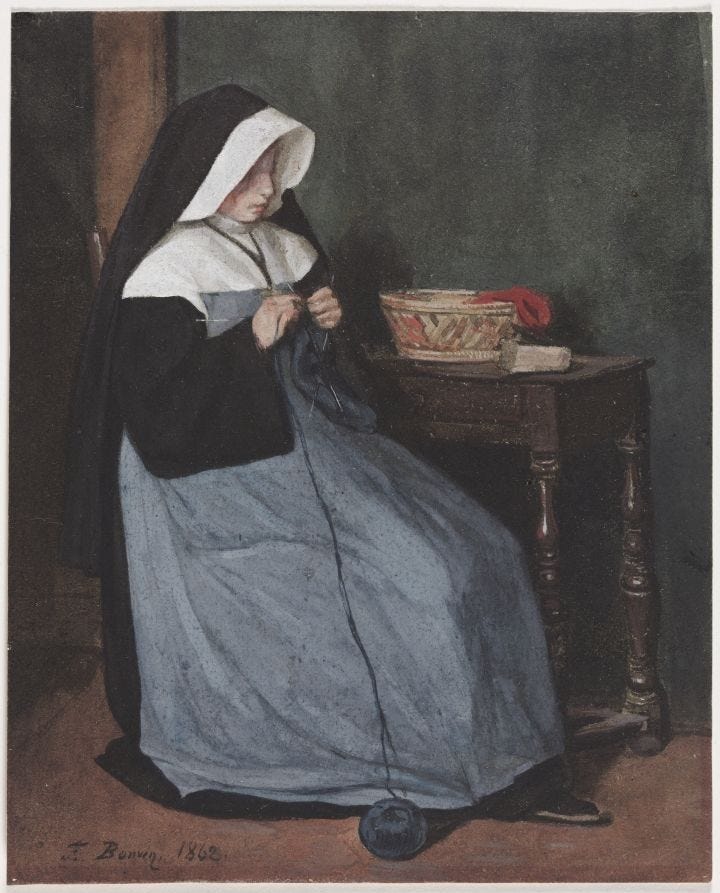




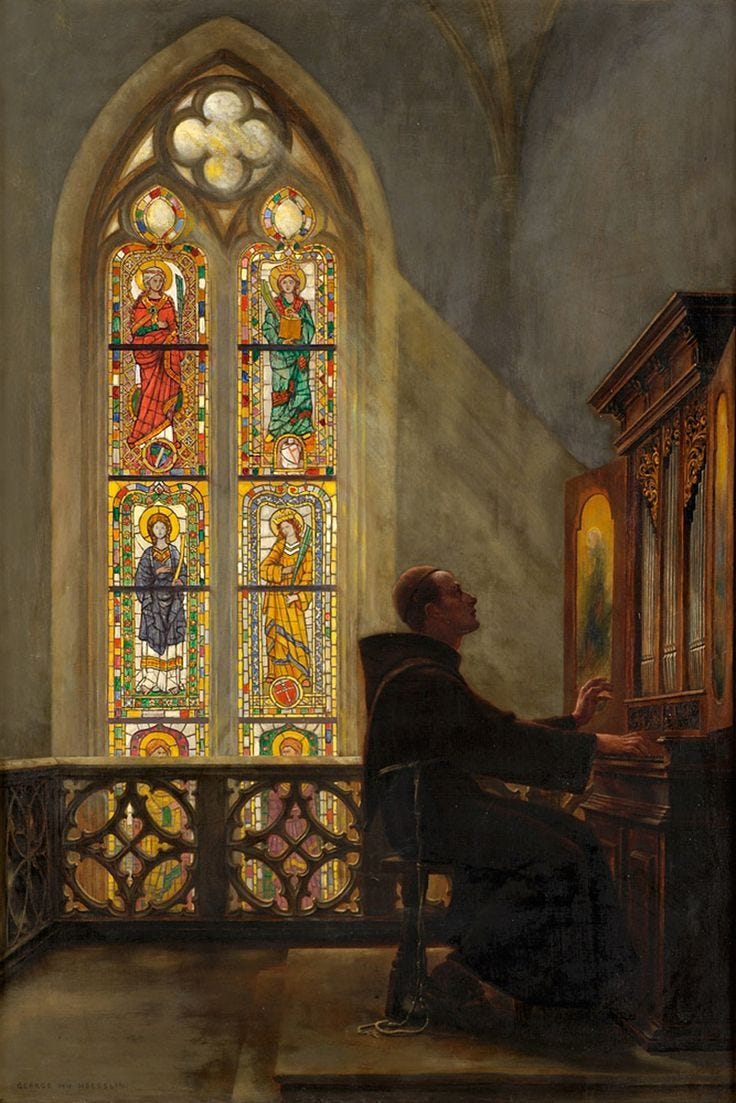
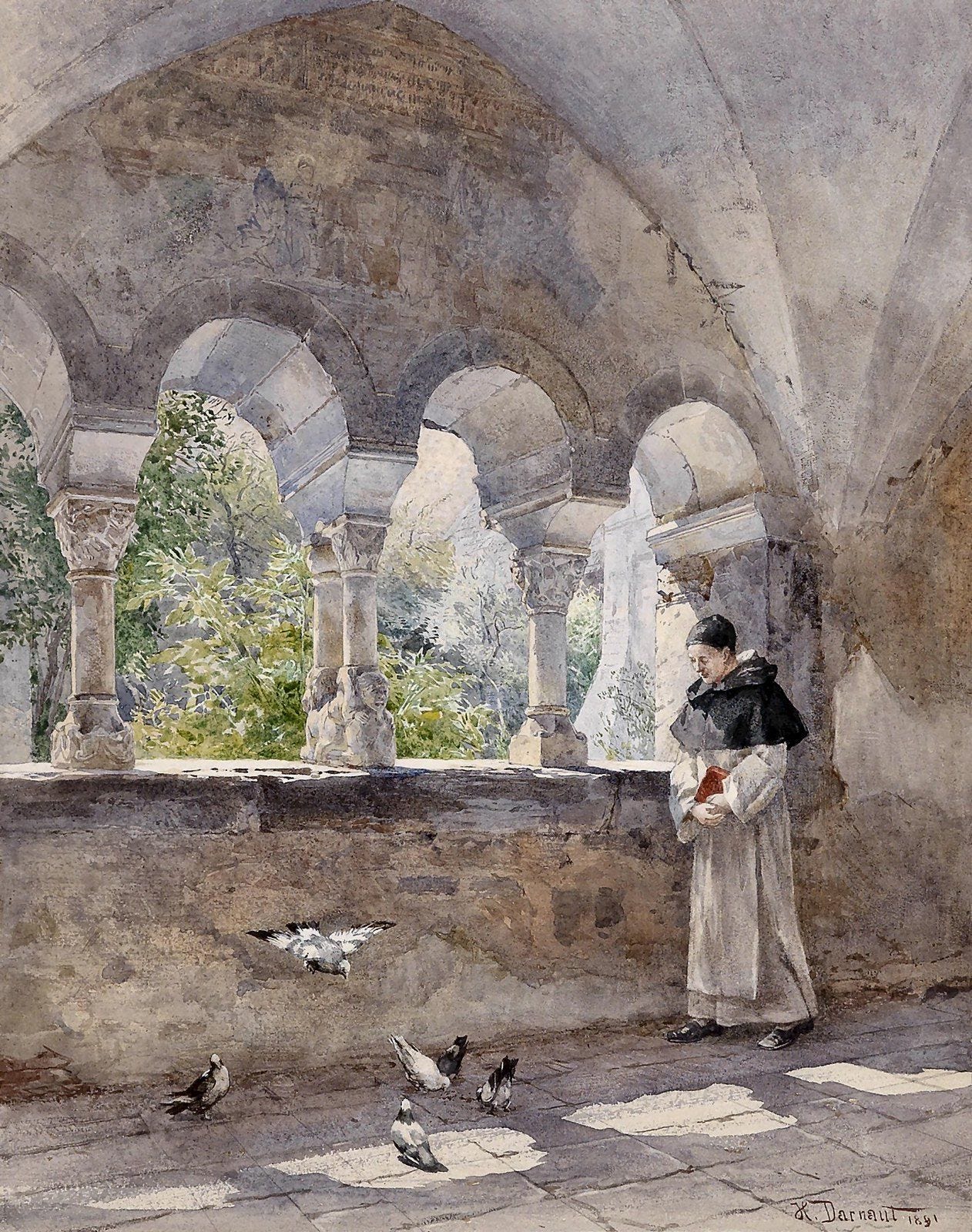
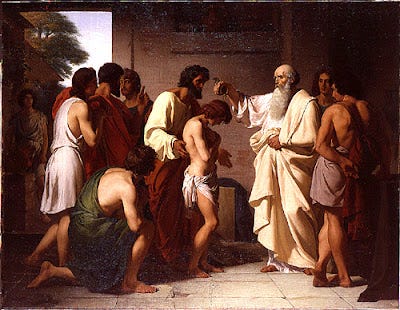
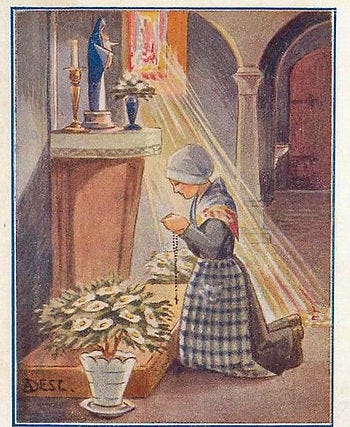

This has one of the most beautiful explanations of humility and pride, but also then faith in Our Lord’s compassionate love. Highly recommend!
https://loretopubs.org/a-retreat-with-saint-therese.html
Thank you so much, again! Your posts are such treasures. God bless and Mary keep you.